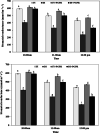Plant Growth-Promoting Rhizobacteria Improve Growth, Morph-Physiological Responses, Water Productivity, and Yield of Rice Plants Under Full and Deficit Drip Irrigation
- PMID: 35288814
- PMCID: PMC8921367
- DOI: 10.1186/s12284-022-00564-6
Plant Growth-Promoting Rhizobacteria Improve Growth, Morph-Physiological Responses, Water Productivity, and Yield of Rice Plants Under Full and Deficit Drip Irrigation
Abstract
Inoculating rice plants by plant growth promoting rhizobacteria (PGPR) may be used as a practical and eco-friendly approach to sustain the growth and yield of drought stressed rice plants. The effect of rice inoculation using plant growth hormones was investigated under drip full irrigation (FI; 100% of evapotranspiration (ETc), and deficit irrigation (DI; 80% of ETc) on growth, physiological responses, yields and water productivities under saline soil (ECe = 6.87 dS m-1) for 2017 and 2018 seasons. Growth (i.e. shoot length and shoot dry weight), leaf photosynthetic pigments (chlorophyll 'a' and chlorophyll 'b' content), air-canopy temperature (Tc-Ta), membrane stability index (MSI%), and relative water content, (RWC%) chlorophyll fluorescence (Fv/Fm) stomatal conductance (gs), total phenols, peroxidase (PO), polyphenol oxidase (PPO), nitrogen contents and water productivities (grain water productivity; G-WP and straw water productivity; S-WP) were positively affected and significantly (p < 0.05) differed in two seasons in response to the applied PGPR treatments. The highest yields (3.35 and 6.7 t ha-1 for grain and straw yields) as the average for both years were recorded under full irrigation and plants inoculated by PGPR. The results indicated that under water scarcity, application of (I80 + PGPR) treatment was found to be favorable to save 20% of the applied irrigation water, to produce not only the same yields, approximately, but also to save more water as compared to I100%.
Keywords: Air–canopy temperature (Tc–Ta); Antioxidant system; Chlorophyll fluorescence; PGPR; Rice; Water relations; Yields.
© 2022. The Author(s).
Conflict of interest statement
The authors declare that they have no competing interests.
Figures
References
-
- Abd El-Mageed TA, Semida WM, Rady MM. Moringa leaf extract as biostimulant improves water use efficiency, physio-biochemical attributes of squash plants under deficit irrigation. Agric Water Manag. 2017;193:46–54. doi: 10.1016/j.agwat.2017.08.004. - DOI
-
- Abd El-Mageed TA, Samnoudi IME, Ibrahim AEM, El Tawwab ARA. Compost and mulching modulates morphological, physiological responses and water use e ffi ciency in sorghum (bicolor L. Moench) under low moisture regime. Agric Water Manag. 2018;208:431–439. doi: 10.1016/j.agwat.2018.06.042. - DOI
-
- Abd El-Mageed TA, El-sherif AMA, Abd El-Mageed SA, Abdou NM. A novel compost alleviate drought stress for sugar beet production grown in Cd-contaminated saline soil. Agric Water Manag. 2019;226:105831. doi: 10.1016/j.agwat.2019.105831. - DOI
-
- Abd El-Mageed TA, Abdurrahman HA, Abd El-Mageed SA. Residual acidified biochar modulates growth, physiological responses, and water relations of maize (Zea mays) under heavy metal-contaminated irrigation water. Environ Sci Pollut Res. 2020;27:22956–22966. doi: 10.1007/s11356-020-08847-5. - DOI - PubMed
-
- Abd El-Mageed TA, Shaaban A, Abd El-Mageed SA, et al. Silicon defensive role in maize (Zea mays L.) against drought stress and metals-contaminated irrigation water. SILICON. 2021;13:2165–2176. doi: 10.1007/s12633-020-00690-0. - DOI
LinkOut - more resources
Full Text Sources
Research Materials


